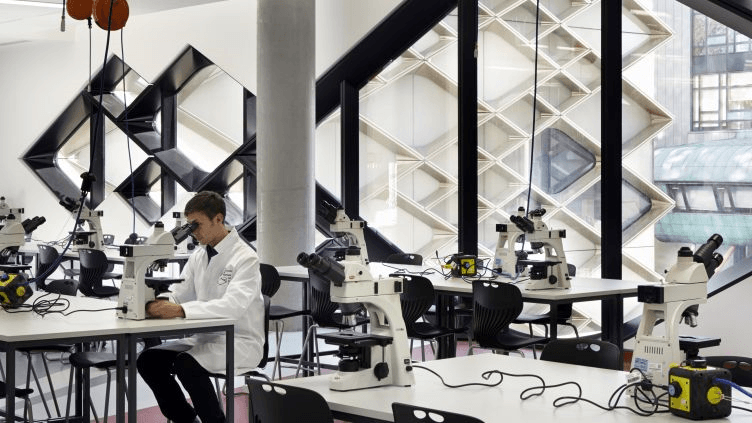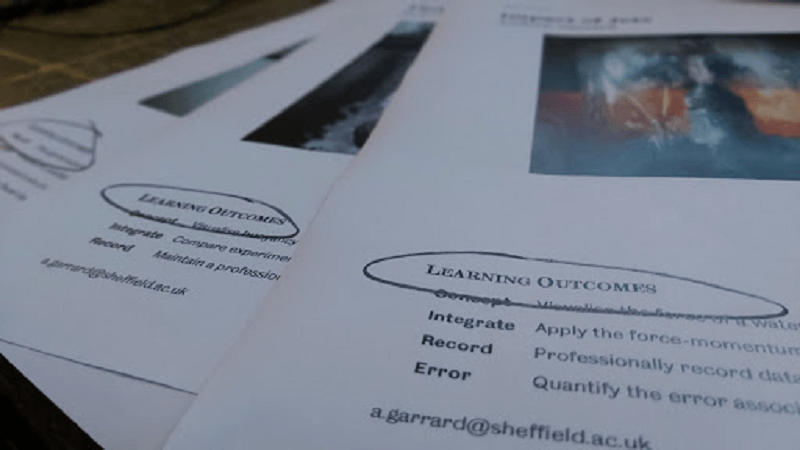I started an Engineering degree at Sheffield University in 1998. Most of my classes took place in the Sir Fredrick Mappin building, a grand, grade II listed, Victorian structure dating back to the turn of the 20th century. I can remember heading into the basement to conduct practicals. These involved a number of us sharing a single piece of equipment, typically something large, made of cast iron that had been bolted to the floor since the 1970s. Classes were usually overseen by a teaching assistant who supplied to us a single sheet of A4 lab instructions from an ancient filing cabinet.

As charming as this nostalgic scene is, the facilities were not sufficient to service the faculty's ambitions to expand student numbers following the removal of the cap on recruitment in 2015. So an £81 million investment was made in a purpose built building, containing bespoke, multidisciplinary laboratories and state of the art experimental equipment, to accommodate large-scale practical teaching. A step more strategic than simply writing a cheque was to create a new department called Multidisciplinary Engineering Education, conceived and led by Professor Stephen Beck. The aim of this department was to focus exclusively on practical engineering education and a dedicated team of staff were appointed to extract as much learning as possible from the substantial investment.

A dedicated team, concentrating only on practical teaching, also provides an opportunity to coordinate and professionalise the delivery. When Stephen met me in a Sheffield coffee shop to discuss applying for a position in his new department, it was the novel model of work allocation that piqued my interest more than the striking new building or shiny new equipment.
My previous experience of organising labs was one in which academic staff were responsible for a small number of practical activities to support their main job of teaching classroom based activities. With attention split between lectures, tutorials, exams, marking, exam boards, endless committees etc. it is difficult to find the time to provide the few practicals you are responsible for the attention they deserve. In addition, while the students would get many labs across a number of different subjects, coordinating with different academics about how practical classes couple together into a coherent programme is yet another time consuming task. The model Stephen was proposing appeared to be a clever and elegant way to overcome these issues. And as an engineer, I find something deeply satisfying about clever and elegant solutions.
I would be interested to hear how practical classes are run and organised at your institution compared to my experience. I’ve composed an anonymous survey, that should be quick to complete and, if you have the time to fill it in, I’d be extremely grateful.

To take advantage of the new department’s convergence of effort on practical teaching, one of the first tasks we engaged with was to define a framework of practical learning outcomes that could be mapped across the diet of all student’s practical classes. This was one of the key elements that assisted us to rapidly pivot to remote delivery following the sudden suspension of face to face teaching due to the Covid-19 pandemic. The dedicated team, who were undistracted by other pressing issues such as how to move assessment online, could consider tactics to respond to the change of operating constraints by considering how to meet the required learning outcomes remotely, rather than necessarily recreating a remote version of the activity.
Compared to classroom teaching, for which off-the-shelf, mature video learning technologies are readily available, moving practical teaching online presents a significant challenge, as this type of teaching often involves touching stuff. The disruption caused by Covid-19 has created renewed interest in the reason for, and method to conduct, practical education, and our department has been at the forefront of publishing, presenting and sharing what we have been doing.
During the summer, we published our remote practical playbook, a learning model to assist deciding what teaching methods are best to meet particular practical learning outcomes. Before returning to a socially distanced autumn semester of face to face teaching, we published a set of top ten tips for blended practicals, to suggest effective mechanisms to maximise learning with far more constrained availability to physical resource.
For the past five years I’ve led the team of academics in our department through the first few rocky years of setting up, tuning our approach to maximize student learning and experience within our envelope of available resources and recently through our response to the global pandemic. Through all of this, we have been focusing on and thinking deeply about one aspect of learning and teaching: Practical Education.
During the keynote presentation at the Advance HE STEM Conference 2021 I hope to share with you some of our thinking and what we have learned. I hope to address interesting questions such as how and why we include practical teaching as part of STEM programmes, if all practical learning outcomes can be achieved remotely and, if so, why we continue to operate in expensive laboratory spaces and what we can take from our experience of the pandemic to improve our delivery in the future?
I look forward to seeing you there.
Dr Andrew Garrard is the deputy head of the department for Multidisciplinary Engineering Education at the University of Sheffield. Andrew was instrumental in establishing the operation of the department which is dedicated to professionally delivering all the practical teaching to students in the Faculty of Engineering.
Further Reading:
- Practical Engineering Education Blog: https://practicalengineeringeducation.blogspot.com/
- Remote Practicals in the Time of Coronavirus, a Multidisciplinary Approach: https://engrxiv.org/d7rkg/
- Codifying an Approach to Remote Practicals: https://www.preprints.org/manuscript/202006.0182/v1
- Practical Engineering Education Conference 2021: https://sites.google.com/sheffield.ac.uk/pee/
Advance HE's STEM Conference 2021 took place on 28 January. Under the overarching theme of Rethinking STEM Higher Education, the conference provided an opportunity to reflect on, learn from, and further progress responses to the Covid-19 crisis, and ensure that approaches to STEM education are more resilient, effective and inclusive.
To view the highlights of STEM Conference 2020, please visit our web page here.